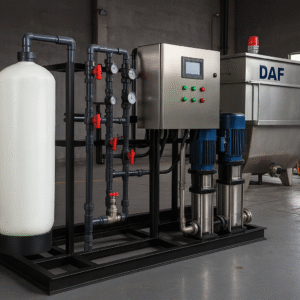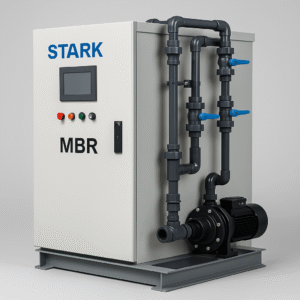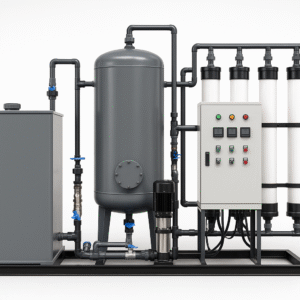STARK Sludge Dewatering Machine for Wastewater Treatment Plants
Optimize sludge management and reduce disposal costs with Stark Water’s STARK Sludge Dewatering Machine. This efficient sludge dewatering machine is specifically designed for wastewater treatment plants, effectively separating liquid from solid sludge to achieve high dewatering rates and ensure environmental compliance.
Product Description
In any wastewater treatment plant, whether municipal or industrial, the management of sludge—the solid byproduct of the purification process—represents a significant operational challenge and cost. The effective reduction of sludge volume is crucial for minimizing disposal expenses, optimizing handling, and ensuring environmental compliance. The Stark Water STARK Sludge Dewatering Machine is meticulously engineered to address this critical need, providing a highly efficient and reliable solution for separating water from solid sludge, transforming it into a manageable cake.
The Essential Role of a Sludge Dewatering Machine in Wastewater Treatment Plants
Our sludge dewatering machine plays an indispensable role in the final stages of wastewater treatment plants. After primary and secondary purification processes, large volumes of liquid sludge are generated. This sludge typically contains a high percentage of water, making it heavy, difficult to transport, and costly to dispose of. The dewatering process significantly reduces the volume and weight of this sludge by removing excess water, resulting in a “sludge cake” with a much higher solid content. This crucial step leads to:
- Reduced Disposal Costs: Minimizing the volume of sludge significantly lowers transportation and landfilling expenses.
- Easier Handling: Dewatered sludge is easier to store, transport, and further process (e.g., for composting or incineration).
- Environmental Compliance: Achieving target solid content levels in sludge often aids in meeting regulatory requirements for disposal or beneficial reuse.
- Improved Operational Efficiency: Streamlining the overall wastewater treatment process by efficiently managing its solid byproduct.
By transforming liquid sludge into a more manageable solid form, our sludge dewatering machine enhances the efficiency and sustainability of wastewater treatment operations.
Advanced Technology for Efficient Solid-Liquid Separation
Stark Water’s Sludge Dewatering Machine incorporates advanced solid-liquid separation technology to achieve high dewatering rates. While specific models may vary (e.g., screw press, belt filter press, or centrifuge), the core principle involves applying mechanical pressure to separate the water from the solid particles in the sludge. Key features often include:
- Continuous Operation: Designed for uninterrupted processing of sludge, ensuring steady performance.
- Automated Control: Equipped with intelligent control systems for automatic operation, monitoring, and optimization of the dewatering process.
- High Solid Content Output: Achieves a high percentage of dry solids in the dewatered cake, maximizing volume reduction.
- Robust Construction: Built from durable, corrosion-resistant materials (e.g., stainless steel for wetted parts) to withstand the abrasive and corrosive nature of sludge.
- Minimal Chemical Consumption: Designed for efficient use of flocculants or conditioning agents to enhance dewatering effectiveness.
This efficient separation ensures optimal sludge cake dryness, contributing to a more effective and economical sludge management strategy for wastewater treatment plants.
Reliability and Versatility for Wastewater Treatment Plants
The STARK Sludge Dewatering Machine is built for long-term reliability and adaptability to various types of wastewater treatment plants, whether municipal or industrial. Its robust construction and automated features minimize maintenance needs and operational complexities, providing a dependable solution for continuous sludge management. By effectively reducing sludge volume and improving its handleability, this machine contributes significantly to the overall efficiency, environmental performance, and cost-effectiveness of your wastewater treatment operations.
Product Parameter
Stark Water’s STARK Sludge Dewatering Machine is engineered for efficient and reliable sludge volume reduction in wastewater treatment plants. Here are its key technical specifications:
| Parameter | Specification / Customization Options |
|---|---|
| Core Keyword Focus | sludge dewatering machine design and capabilities. |
| Dewatering Technology | Screw Press, Belt Filter Press, Centrifuge, or Plate-and-Frame Filter Press. Specific model based on sludge type and desired dryness. |
| Processing Capacity (Sludge) | Customizable, ranging from 0.5 m³/hr to 100+ m³/hr (wet sludge flow), or 5 kgDS/hr to 500+ kgDS/hr (kilograms of dry solids per hour). |
| Sludge Type Compatibility | Suitable for municipal sewage sludge, industrial wastewater sludge (e.g., chemical, food, pharmaceutical, textile, mining). |
| Solid Content in Dewatered Cake | Achievable dry solids content typically 15% – 40% (or higher, depending on technology and sludge characteristics). |
| Construction Material | Stainless Steel (SUS304 or SUS316L for all wetted parts), Carbon Steel (for frame, coated). Chosen for corrosion and abrasion resistance. |
| Chemical Dosing System | Integrated automatic polymer dosing system (flocculant preparation and dosing pump) for sludge conditioning. |
| Control System | Fully Automatic PLC Control with HMI (optional), real-time monitoring of pressure, flow, solid content, and alarm functions. Automatic operation, cleaning, and shutdown. |
| Power Supply | 3 Phase, 380V/415V/460V, 50Hz/60Hz (Customizable). |
| Water Discharge | Filtered water (filtrate) can be returned to head of wastewater treatment plant for further processing. |
| Noise Level | Optimized for low noise operation in plant environments. |
| Dimensions (Approximate) | Skid-mounted compact design (e.g., L 2000mm x W 1000mm x H 1500mm for a medium screw press). Varies significantly by capacity and type. |
| Operating Temperature | 5°C – 45°C. |
| Compliance | Designed to meet relevant environmental and safety standards. |
Applicable Industry
The STARK Sludge Dewatering Machine is a vital and adaptable component for efficient sludge management across a broad spectrum of wastewater treatment plants and industries. Its robust design and effectiveness in reducing sludge volume make it indispensable for:
- Municipal Wastewater Treatment Plants: Essential for dewatering sludge generated from primary and secondary treatment processes, significantly reducing sludge volume for easier disposal (e.g., landfilling, composting) and lowering operational costs.
- Industrial Wastewater Treatment Plants: For dewatering various types of industrial sludge, including those from:
- Food & Beverage Industry: Treating sludge from dairies, breweries, meat processing, and juice production.
- Chemical & Pharmaceutical Industry: Managing sludge containing inert solids, precipitates, or biological waste.
- Textile & Dyeing Industry: Dewatering sludge containing dyes, fibers, and processing chemicals.
- Pulp & Paper Industry: Treating sludge with high fiber content from paper production.
- Mining & Metallurgy: For dewatering mineral concentrates, tailings, and process wastewater sludge.
- Electroplating & Metal Finishing: Separating heavy metal hydroxides and other solids from treatment effluents.
- Water Treatment Plants (Potable Water): For dewatering sludge generated from clarification (e.g., flocculation/sedimentation) and filtration processes of drinking water.
- Agricultural (Manure Management): Some models can be adapted for dewatering animal manure slurries, facilitating easier handling and beneficial reuse as fertilizer.
- Environmental Remediation Sites: For dewatering contaminated soils or sludges from remediation projects.
- Landfill Leachate Treatment: Reducing the volume of sludge generated from treating landfill leachate.
- Oil & Gas Industry: Managing sludge from produced water treatment or drilling muds.
Advantage One
The STARK Sludge Dewatering Machine offers the significant advantage of significant sludge volume reduction and substantial lower disposal costs for wastewater treatment plants. By effectively separating the water from solid sludge, this sludge dewatering machine dramatically reduces the overall volume and weight of the sludge byproduct. This directly translates into minimized expenses associated with sludge transportation and final disposal (e.g., landfilling, incineration). Achieving a higher dry solids content in the dewatered cake means fewer truckloads and less landfill space required, providing substantial economic benefits and contributing to a more sustainable and cost-effective wastewater management strategy for various industrial and municipal operations.
Advantage TWO
Our Sludge Dewatering Machine provides the dual advantage of continuous automatic operation and robust reliability, even when processing demanding sludge types. Designed for seamless, uninterrupted performance, this sludge dewatering machine can be integrated into automated wastewater treatment plants, reducing the need for constant manual supervision and lowering labor costs. Its robust construction, typically featuring stainless steel for all wetted parts, ensures exceptional durability and resistance to the abrasive and corrosive nature of various sludges. This reliable design minimizes downtime, extends operational lifespan, and guarantees consistent dewatering performance, providing a highly dependable and efficient solution for managing the challenging solid byproducts of wastewater treatment plants, enhancing overall operational efficiency and environmental compliance.
Related Products
Gerelateerde producten
- Apparatuur voor rioolwaterzuivering
STARK Dissolved Air Flotation (DAF) System for Industrial Wastewater Pretreatment
Toevoegen aan offerte - Apparatuur voor rioolwaterzuivering
STARK MBR Wastewater Treatment System for High-Quality Effluent
Toevoegen aan offerte - Apparatuur voor rioolwaterzuivering
STARK Integrated Sewage Treatment Plant for Municipal & Industrial Use
Toevoegen aan offerte
FAQ
Q1: How long does the reverse osmosis system last?
The lifespan of a reverse osmosis system depends on water quality and maintenance. Typically, the membrane lasts 2–3 years, while the system itself can last over 10 years with proper care.
Q2: Can the system be customized based on different water conditions?
Yes, all our systems are fully customizable. We analyze your water report and application needs before providing tailored solutions.
Q3: What standards does STARK equipment comply with?
Our products comply with CE, ISO 9001, and can be designed to meet specific regional regulations or industry standards upon request.
Q4: What is the delivery time for STARK RO systems?
Standard systems are shipped within 7–15 days. For customized orders, lead time may extend to 20–25 days depending on complexity.
Q5: Do you provide technical support or installation guidance?
Yes. We provide full technical documentation, remote guidance via video, and can dispatch engineers internationally upon request.
Q6: What is included in your quotation?
Our quotation includes the full RO system, control panel, pumps, pre-treatment units, and all necessary fittings. Installation tools and spare parts can be included upon request.











